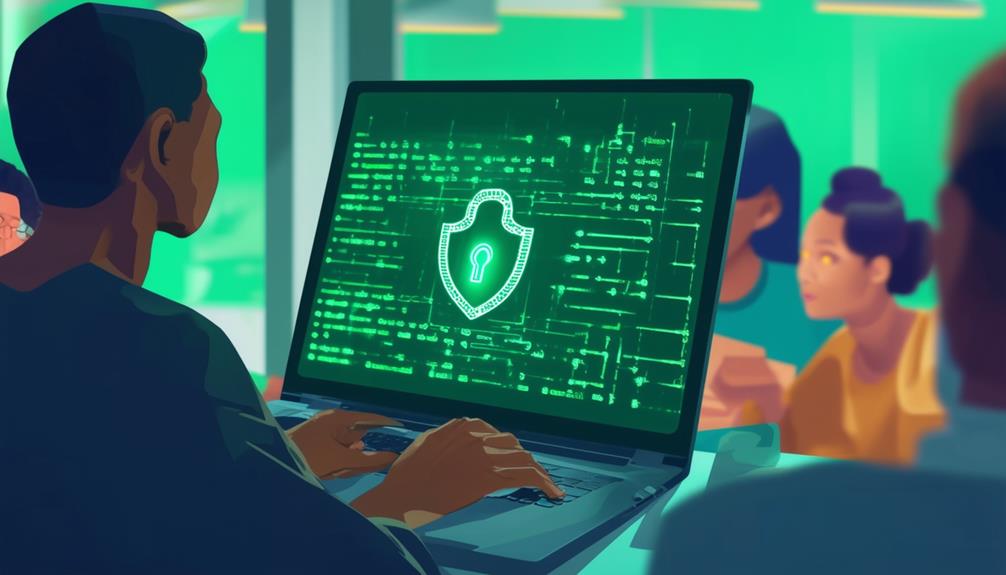Choosing between ethical hacking and software development depends on your interests and career goals. Ethical hacking involves identifying cybersecurity vulnerabilities, while software development focuses on creating applications. Ethical hackers need to grasp hacking methods and security tools, whereas software developers emphasize coding and software design. Career paths differ, with ethical hackers often becoming security analysts and developers progressing to roles like technical architects. Both fields require specific skills and training, such as network protocols for hacking and programming languages for development. Consider industry trends, advancement opportunities, and personal preferences to align with the right career path.
Key Takeaways
- Choose ethical hacking for a focus on cybersecurity, identifying vulnerabilities, and using hacking techniques.
- Opt for software development for creating software applications, mastering programming languages, and software design principles.
- Select ethical hacking for roles like security analysts, penetration testers, and incident responders.
- Consider software development for career paths as software developers, systems analysts, or technical architects.
- Evaluate earning potential, industry trends, and personal interests to make an informed decision.
Ethical Hacking Vs. Software Development
When comparing ethical hacking to software development, each field showcases distinct focuses and skill requirements. Ethical hacking revolves around identifying vulnerabilities in systems and enhancing security through techniques like penetration testing. Individuals in this field must possess a deep understanding of hacking methods, cybersecurity tools, and network protocols.
On the other hand, software development involves creating software applications using multiple programming languages with an emphasis on coding and software design principles. Software developers primarily focus on developing functional and user-friendly software.
In terms of career paths, ethical hacking offers opportunities such as security analysts and penetration testers, while software development provides roles like software developers and technical architects. Ethical hackers play a critical role in safeguarding systems against cyber threats, ensuring data confidentiality and integrity.
Conversely, software developers contribute to building innovative software solutions that meet user needs and enhance operational efficiency. Both fields require unique skill sets, with ethical hacking emphasizing cybersecurity tools and networking, while software development concentrates on programming languages and software design principles.
Career Paths Comparison

Within the tech industry, career paths in ethical hacking and software development offer diverse opportunities for professionals seeking to specialize in cybersecurity or software engineering.
Ethical hackers typically pursue roles such as security analyst, penetration tester, or incident responder. These professionals focus on identifying vulnerabilities in systems and improving overall security measures to protect against cyber threats.
On the other hand, software development encompasses career paths like software developer, systems analyst, and technical architect. Software developers primarily concentrate on creating software applications and designing user-friendly solutions to meet specific needs.
Both fields provide unique challenges and opportunities for growth. Ethical hackers play an important role in safeguarding digital assets by proactively testing systems for weaknesses, while software developers contribute to technological advancements by designing innovative solutions.
Understanding the distinct career paths within ethical hacking and software development can help individuals decide which path aligns best with their interests and professional aspirations in the ever-evolving tech industry.
Skills and Interests Assessment

To determine the most suitable career path in the tech industry between Ethical Hacking and Software Development, individuals should assess their skills and interests thoroughly.
For Ethical Hacking, it is important to evaluate proficiency in network protocols, cybersecurity tools, and various operating systems. Understanding how these components work together to identify vulnerabilities and enhance system security is essential. Analytical skills and the ability to interpret complex information play a significant role in Ethical Hacking.
On the other hand, Software Development requires a strong grasp of programming languages, software design principles, and databases. Problem-solving abilities, teamwork skills, and proficiency in debugging and testing are valuable assets in Software Development.
Exploring career opportunities such as Ethical Hacker, Security Analyst, or Penetration Tester for Ethical Hacking, and Software Developer, Systems Analyst, or Quality Assurance Engineer for Software Development can provide insight into which path aligns best with one's long-term goals and interests in cybersecurity or software development.
Job Responsibilities Overview

An essential aspect of Ethical Hacking involves identifying vulnerabilities and enhancing system security through penetration testing, while Software Development focuses on creating functional and user-friendly software applications using various programming languages. Ethical hackers are tasked with understanding hacking techniques, utilizing cybersecurity tools, and conducting penetration testing to uncover weaknesses in systems. On the other hand, software engineers focus on applying software design principles, following coding best practices, and developing robust and efficient software solutions.
To provide a clearer comparison between the job responsibilities in Ethical Hacking and Software Development, let's take a look at the table below:
| Job Aspect | Ethical Hacking | Software Development |
|---|---|---|
| Main Focus | Identifying vulnerabilities and enhancing system security | Creating functional and user-friendly software applications |
| Required Skills | Knowledge of hacking techniques and cybersecurity tools | Understanding of software design principles and coding best practices |
| Daily Tasks | Conducting penetration testing, reporting vulnerabilities | Developing software following specific methodologies |
| Career Opportunities | Security Analyst, Penetration Tester | Software Developer, DevOps Engineer |
This table highlights the distinct responsibilities and skill sets required in Ethical Hacking and Software Development.
Training and Education Requirements

Ethical hacking and software development each have distinct training and education requirements.
While ethical hacking often necessitates industry certifications like CEH or OSCP, specialized training in areas such as penetration testing and network security can benefit ethical hackers.
On the other hand, software development typically calls for a degree in computer science or related fields. Software developers usually focus on mastering multiple programming languages and development methodologies.
Education for Ethical Hacking
Specialized training programs, certifications, and hands-on experience in cybersecurity form the foundation of education for ethical hacking. Individuals interested in ethical hacking often pursue certifications such as Certified Ethical Hacker (CEH), Certified Information Systems Security Professional (CISSP), and Offensive Security Certified Professional (OSCP) to gain credibility and demonstrate their expertise.
Universities and online platforms offer courses in ethical hacking, network security, and penetration testing to equip aspiring ethical hackers with the necessary technical knowledge and skills. Important experience plays a significant role in mastering ethical hacking, with internships, participation in capture the flag (CTF) competitions, and engagement in real-world projects being essential components of the learning process.
Continuous learning is essential in this field, as staying updated on the latest cyber threats and security trends is imperative for success in ethical hacking. By combining education, certifications, and practical experience, individuals can establish a strong foundation for a career in ethical hacking.
Training for Software Development
Training for software development involves acquiring proficiency in programming languages such as Python, Java, or JavaScript, along with an understanding of software engineering principles and development methodologies.
Many universities offer specialized courses in software engineering, emphasizing software design principles and development methodologies.
Additionally, online platforms and coding bootcamps provide thorough training in software development, enabling students to work on real-world projects.
Hands-on experience gained through internships or freelance projects is highly valuable for developing practical skills in software development.
Continuous self-study and practice are essential for mastering software development concepts and keeping up with industry trends.
This all-encompassing training approach ensures that aspiring software developers are equipped with the necessary technical skills, theoretical knowledge, and practical experience to excel in the dynamic field of software development.
Salary and Compensation Analysis

When comparing the salary and compensation levels between ethical hackers and software developers, it becomes evident that ethical hackers generally command higher earnings due to the specialized nature of their work and the increasing demand for cybersecurity expertise. Ethical hackers, with average salaries ranging from $70,000 to $120,000 annually, can see their earnings climb beyond $150,000 with advanced certifications like CISSP or OSCP.
On the other hand, software developers typically earn between $60,000 to $110,000 per year, influenced by factors such as programming language expertise and company size. The varied salary ranges for software developers may be impacted by location, industry, and specific roles within software development.
In the field of cybersecurity, where protecting sensitive information is paramount, the unique skill set possessed by ethical hackers is highly valued, leading to competitive compensation packages compared to their software development counterparts.
Advancement Opportunities

Advancing in the field of ethical hacking or software development opens doors to a range of specialized roles and responsibilities. In ethical hacking, individuals can progress to become security analysts, penetration testers, or security consultants. These roles involve conducting vulnerability assessments, penetration testing, and providing expert advice on security measures.
On the other hand, software development offers advancement opportunities as software developers, technical architects, and quality assurance engineers. Software developers focus on creating and maintaining software applications, while technical architects design complex systems and infrastructure. Quality assurance engineers guarantee that the software meets quality standards through rigorous testing processes.
Furthermore, ethical hacking can lead to specialized roles in incident response, digital forensics, and security management. Similarly, software engineering advancements may include opportunities in DevOps, system architecture, and project management. Both fields offer growth potential through continuous learning, certifications, and hands-on experience, allowing individuals to carve out rewarding career paths in cybersecurity or software development.
Industry Trends and Growth

In light of the escalating demand for cybersecurity experts and software developers, it is imperative to examine the current industry trends and growth projections shaping these dynamic fields.
The cybersecurity market is on a rapid growth trajectory, with projections indicating it will reach $345.4 billion by 2026. This growth underscores the high demand for ethical hackers to combat cyber threats and protect valuable data.
Simultaneously, the software development industry is forecasted to expand by 22% from 2019 to 2029, presenting numerous career opportunities for software developers. With over 2.8 million unfilled positions in cybersecurity globally, professionals in this field are highly sought after.
Software developers, on the other hand, can anticipate a median salary of $107,510 per year, showcasing the lucrative nature of this industry. Both ethical hacking and software development offer diverse career paths and opportunities for growth, making them appealing choices for individuals looking to thrive in the ever-evolving tech sector.
Networking and Professional Development

Networking and professional development play pivotal roles in fostering growth and success within the domains of ethical hacking and software development careers. Building connections in the networking industry is essential for sharing knowledge and exploring job opportunities in information security. Professionals in Wi-Fi planning and high availability must focus on IP KPIs to guarantee network efficiency and security in the ever-evolving cybersecurity landscape.
| Networking Industry | Information Security | Wi-Fi Planning |
|---|---|---|
| High Availability | IP KPIs | Cybersecurity Landscape |
Engaging with industry-specific organizations and attending conferences can provide valuable insights for individuals pursuing careers in these fields. Continuous learning through certifications like CEH or OSCP for ethical hacking or mastering programming languages for software development is vital. Participation in online communities, forums, and workshops can further enhance professional growth in both domains. Staying updated with industry trends through webinars and relevant publications is key to advancing in these dynamic fields.
Personal Reflections and Decision Making

Consider your interests, skills, and career goals when deciding between ethical hacking and software development. Reflect on your aptitude for identifying vulnerabilities, improving security, and problem-solving in either cybersecurity or software projects.
Evaluate the future career prospects and fit based on whether you lean towards proactive security measures or creating user-friendly software applications.
Self-Assessment for Fit
Upon introspection of one's problem-solving acumen and technical proficiencies, a determination can be made regarding the suitability of ethical hacking or software development as a career path.
To assess your fit in these fields, consider the following:
- Reflect on your interest in problem-solving and critical thinking to gauge which role aligns better with your strengths.
- Evaluate your passion for cybersecurity and coding to determine which field offers more fulfillment and growth opportunities.
- Assess your technical skills in network protocols, cybersecurity tools, and programming languages to align with your career goals.
- Think about your long-term aspirations and the industry demand for ethical hackers or software developers to make an informed decision.
- Seek guidance from professionals in both areas, explore online resources, and participate in relevant workshops to gain insights into the day-to-day responsibilities and challenges of each role.
Future Career Prospects
In contemplating future career prospects in ethical hacking or software development, individuals must carefully weigh their personal inclinations and professional aspirations. When considering a career in ethical hacking, one should acknowledge the increasing demand for cybersecurity professionals due to the rising number of cyber threats.
On the other hand, software development offers a wide range of job opportunities in various industries, reflecting the continuous need for skilled developers to create innovative solutions.
In terms of salary growth, both fields can be lucrative, with ethical hackers often commanding high salaries due to their specialized skills in identifying vulnerabilities. Software developers also enjoy competitive pay scales, especially as they gain more experience and expertise in coding and programming.
Ultimately, the decision between ethical hacking and software development should align with one's passion for either analyzing security threats or coding software applications. Seeking advice from professionals in both fields can provide valuable insights into the day-to-day responsibilities and future growth prospects, aiding in making an informed career choice.
Frequently Asked Questions
Which Is Better, Ethical Hacking or Software Development?
When contemplating career paths, it is crucial to weigh the pros and cons of ethical hacking and software development. Each field offers unique challenges and opportunities, necessitating distinct skill sets and expertise to excel.
Do Ethical Hackers Make More Than Software Engineers?
When comparing the earnings of ethical hackers and software engineers, factors like specialization, location, and industry demand play significant roles. Ethical hackers may command higher salaries in certain specialized roles, while software engineers in tech hubs or with niche skills can earn more.
Who Earns More, Developer or Hacker?
When comparing earnings between developers and hackers, developers tend to earn higher salaries on average due to broader career opportunities and potential for advancement. However, factors like expertise, location, and industry specialization can influence individual earning potentials.
Can a Software Developer Become an Ethical Hacker?
A software developer can shift to becoming an ethical hacker by acquiring knowledge in cybersecurity principles and tools. This change requires additional training, certifications, and hands-on experience in cybersecurity practices to effectively identify vulnerabilities and conduct penetration testing.
Conclusion
To sum up, when deliberating between ethical hacking and software development, it is crucial to take into account your skills, interests, and career goals.
As the saying goes, 'Choose a job you love, and you will never have to work a day in your life.'
Whether you are attracted to the technical challenges of ethical hacking or the creative aspects of software development, both fields offer unique opportunities for growth and advancement in the ever-evolving technology industry.









